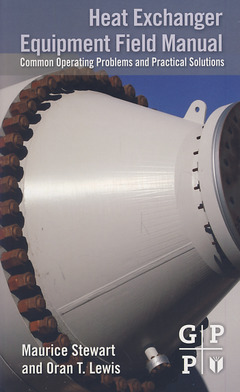Description
Heat Exchanger Equipment Field Manual
Common Operating Problems and Practical Solutions
Authors: Stewart Maurice, Lewis Oran T.
Language: English
Subjects for Heat Exchanger Equipment Field Manual:
Keywords
air-cooled exchangers; alterations; API 510; ASME Code; baffles; bath heaters; bundle removal; cooling towers; corrosion; destructive inspection; direct-fired heaters; documentation; double pipe; exchanger alteration; heat exchangers; heat transfer duty; heat treatment; hydrotesting; indirect-fired heaters; inspection techniques; multitube hairpin; name plate; National Board Inspection Code; nomenclature; nondestructive inspection; plate and frame; plate fin (brazed aluminum); postweld heat treatment; quality control; repairs; rerating; retrofitting; shell and tube; shell repair; waste heat recovery
488 p. · 12.3x18.8 cm · Paperback
Description
/li>Contents
/li>Readership
/li>Biography
/li>Comment
/li>
From upstream to downstream, heat exchangers are utilized in every stage of the petroleum value stream. An integral piece of equipment, heat exchangers are among the most confusing and problematic pieces of equipment in petroleum processing operations. This is especially true for engineers just entering the field or seasoned engineers that must keep up with the latest methods for in-shop and in-service inspection, repair, alteration and re-rating of equipment. The objective of this book is to provide engineers with sufficient information to make better logical choices in designing and operating the system. Heat Exchanger Equipment Field Manual provides an indispensable means for the determination of possible failures and for the recognition of the optimization potential of the respective heat exchanger.
Heat Exchanger Field ManualPart One: Heat Transfer EquipmentTypical Process Heating and Cooling ApplicationsBasic Heat Transfer TheoryPart Two: ConfigurationsHeat Exchanger ConfigurationsFain-Fan Air CoolersEquipment Selection and SizingPart Three: Troubleshooting and Maintenance Operating ProblemsTypical Control Schemes
This book is written for personnel engaged in projects or operations that are or will be responsible for evaluating, selecting, and designing, specifying, inspecting, altering or re-rating heat transfer equipment. This includes petroleum, chemical and mechanical engineers who are in petroleum production, refining and gas processing and plant operations, technical services, and project design; or with assignments involving heat exchanger sizing, specification, or operation.
Oran T. Lewis, is an Adjunct Instructor with over 30 years experience in the erection, maintenance, inspection, fabrication, modification and repair of pressure and piping equipment, as well as presenting education courses for piping inspection, weld and pressure equipment inspection. His certifications are, in order of obtainment, National Board of Boiler and Pressure Vessel Inspector Authorized Inspector, AWS Certified Welding Inspector, API 510 Certified Pressure Vessel Inspector, API 570 Certified Piping Inspector, NACE Level 1 Corrosion.
- Step-by-step procedure on how to design, perform in-shop and in-field inspections and repairs, perform alterations and re-rate equipment
- Select the correct heat transfer equipment for a particular application
- Apply heat transfer principles to design, select and specify heat transfer equipment
- Evaluate the performance of heat transfer equipment and recommend solutions to problems
- Control schemes for typical heat transfer equipment application




